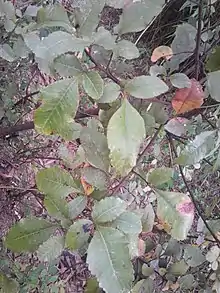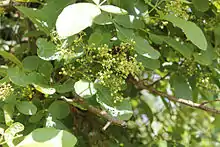Toxicodendron parviflorum
Toxicodendron parviflorum commonly known as small-flowered poison sumac is a much-branched shrub bearing stalked leaves with three leaflets; the end leaflet is larger than the other two. The leaflets are obovate, with rounded tips, tapering bases and irregularly toothed margins. The flowers are tiny, yellowish and fragrant. The fruit is small, round and red when ripe. T. parviflorum is found in the Himalayas, from Kumaun to Bhutan, at altitudes of 700–1,100 metres (2,300–3,600 ft).[1]
| Toxicodendron parviflorum | |
|---|---|
 | |
| Scientific classification | |
| Kingdom: | Plantae |
| Clade: | Tracheophytes |
| Clade: | Angiosperms |
| Clade: | Eudicots |
| Clade: | Rosids |
| Order: | Sapindales |
| Family: | Anacardiaceae |
| Genus: | Toxicodendron |
| Species: | T. parviflorum |
| Binomial name | |
| Toxicodendron parviflorum | |

Toxicodendron parviflorum fruit
This article is issued from Wikipedia. The text is licensed under Creative Commons - Attribution - Sharealike. Additional terms may apply for the media files.